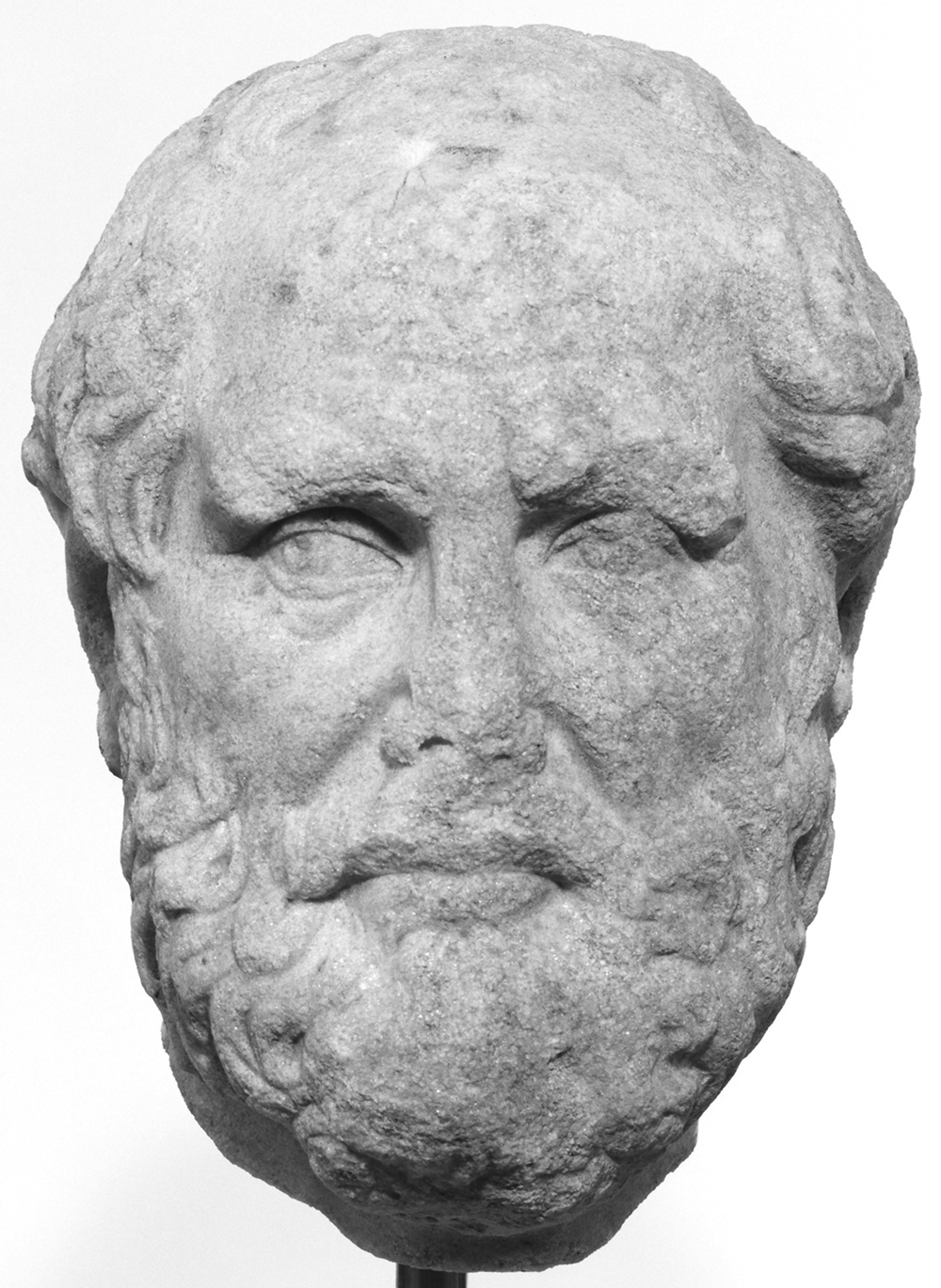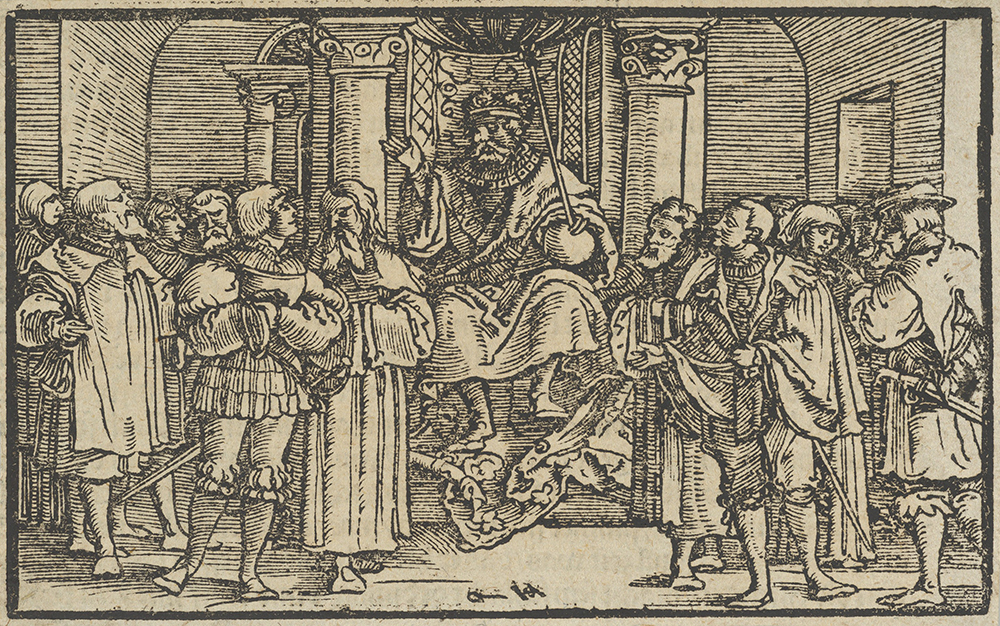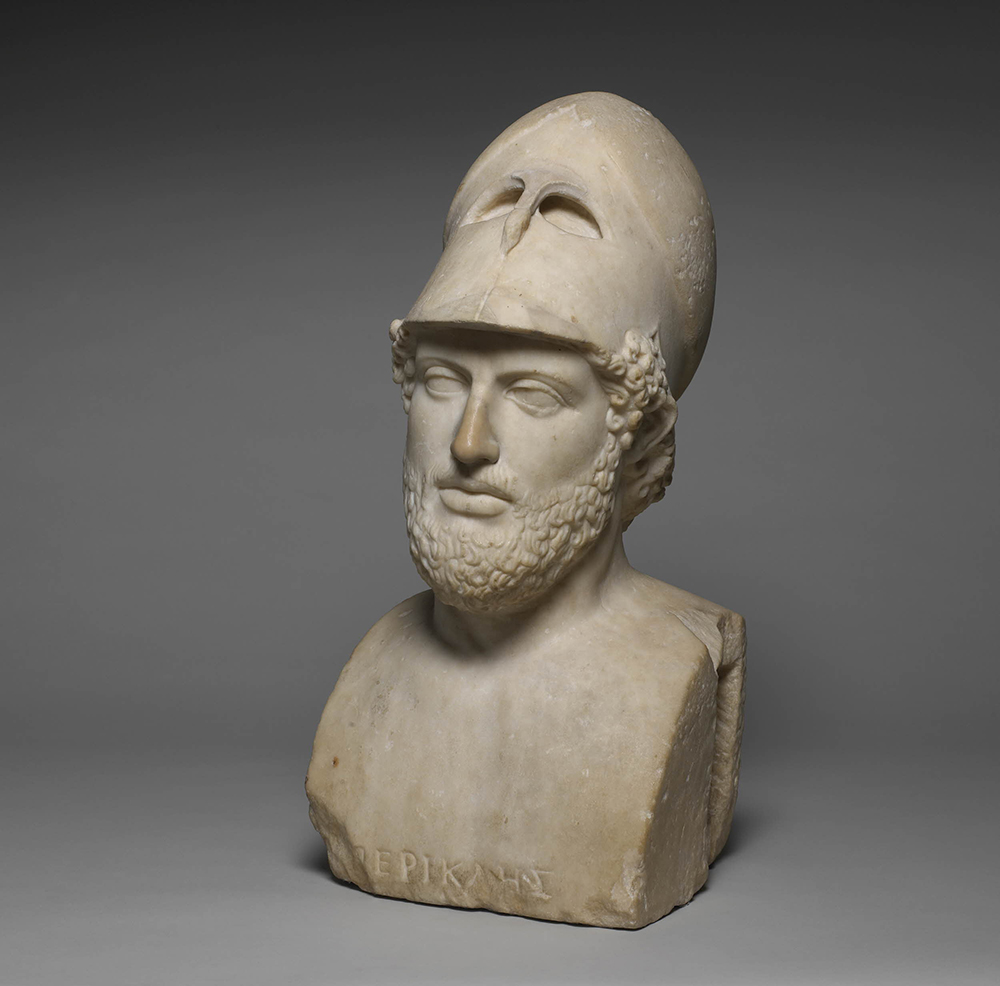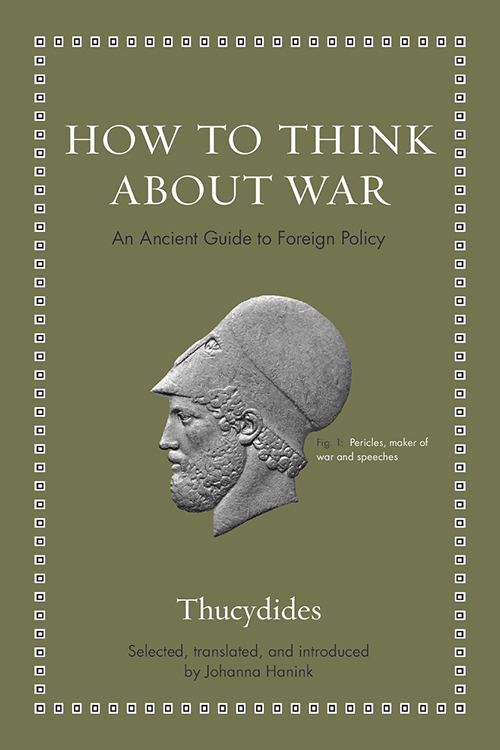On August 11, 1777, John Adams, then a delegate to the Second Continental Congress in session in Philadelphia, wrote a letter to his ten-year-old son, John Quincy. In light of the ongoing War of Independence and with a mind to other wars and “Councils and Negotiations” that the future might hold for the boy, Adams urged him “to turn your Thoughts early to such Studies, as will afford you the most solid Instruction and Improvement for the Part which may be allotted you to act on the Stage of Life.” He gave one recommendation in particular: “There is no History, perhaps, better adapted to this usefull Purpose than that of Thucidides.” For Adams, Thucydides’ History of the Peloponnesian War contained within it insight of every possible “usefull” sort: “You will find it full of Instruction to the Orator, the Statesman, the General, as well as to the Historian and the Philosopher.”
For centuries, Thucydides has been made to wear each of those very hats. Politicians and military personnel, historians, political scientists, and classicists have all laid claim, often in radically different ways, to his work and wisdom. Today, the History enjoys a status—in university curricula, among political theorists, and in military and policy communities—as a foundational source for theorizations of democracy, international relations, war, and human and state behavior. Thucydides himself might not be disappointed to know this, for toward the beginning of his History he announces that he has composed his work with future ages in mind:
We know little about Thucydides’ own life. He begins his History by identifying himself as an Athenian; its first words are “Thucydides the Athenian composed the War of the Peloponnesians and Athenians…” He claims that he was alive for all of that war, and implies that, from its start, he was old enough to understand its events. He tells us that he was serving as elected general in 424, which means that he was likely born in the early 450s. Thucydides thus came of age in the brief but momentous era that saw the Athenian Empire at its height. When Thucydides narrates his own role in the war, he refers to himself in the third person as the son of Olorus (Olorus was an aristocratic name associated with Thrace, the region to the northeast of Greece). In Book 2, he mentions that he survived the plague that devastated Athens during the first years of the war. In Book 4, he narrates how, in 424, he led the Athenian forces in an attempt to preserve the Athenians’ hold on Amphipolis, their valuable base in Thrace. He was entrusted with the mission, he explains, because of his stake in the local gold mines and the influence that this granted him in the region. He arrived too late, however, to prevent Athens from losing Amphipolis to the Spartans under the command of the extraordinary general Brasidas.

Portrait head of Thucydides, Roman Empire, second century. The J. Paul Getty Museum. Digital image courtesy of the Getty’s Open Content Program.
For that failure, the Athenians cast Thucydides into exile, where he would remain for twenty years. That long exile was precisely what allowed him the peace and quiet needed to work on his History and to conduct interviews with parties on both sides of the conflict. The History shows full knowledge of the outcome of the war, which ended in 404; Thucydides is therefore assumed to have died in about 400. This is the extent of the biographical information that can be inferred from his work; additional details are furnished by later ancient biographers but should be treated with caution.
Thucydides organized his History by campaign season—consecutive winters and summers of the war—and the text’s arrangement in eight books is not his own. The work’s degree of completion is still a matter of debate; some scholars have seen the lack of speeches in Book 5 (the Melian Dialogue is not, strictly speaking, a speech) and Book 8 as the result of the work’s unfinished state. In his extensive critical essay On Thucydides, the ancient critic Dionysius of Halicarnassus (first century bc) noted that Cratippus, Thucydides’ younger contemporary and supposed editor, had commended the lack of “assembly speeches” toward the end of the History because he found their earlier prevalence “hindering” and even “annoying.”
Modern readers of the History rarely voice that complaint, though they have often wondered to what extent the speeches are Thucydides’ own compositions. Toward the beginning of his work, Thucydides provides this account of his methodology:
The Athenian speeches, along with the Melian Dialogue, are so often read, studied, and cited today in large part for their presentation of what has come to be known as the “Athenian thesis.” That thesis has two parts: first, it is the very nature of people and states (and even gods) to seek constantly to expand and exercise their power; second, they should not be blamed for doing so, seeing as it is simply human nature. A corollary to this thesis is that the abstract concept of moral justice has no real bearing in the realm of interstate relations.

Representatives of Athens and Corinth at the Court of Archidamas, King of Sparta, from The History of the Peloponnesian War by Thucydides, woodcut by Hans Schäufelein, 1533. The Metropolitan Museum of Art, Gift of Harry G. Friedman, 1962.
The first articulation of such a thesis appears in a speech made by Athenians in Sparta, to Spartans and other members of the Peloponnesian League, on the eve of the war. In Sparta, the Athenians argue that they simply acted in accordance with “human nature” (literally the “human way”) when they “accepted the empire that was handed to” them:
Due principally to the positions expressed in the Athenian speeches, in the aftermath of World War II Thucydides was adopted as a forefather of the international relations paradigm now known as classical realism. That paradigm regards nation-states as rational actors engaged in constant struggles for power and security; it also assumes there is such a constant as “human nature” that can be used to explain state behavior. The “Athenian thesis,” however, was not named as such until later, when University of Chicago philosopher Leo Strauss coined the phrase in his 1964 book The City and the Man. There Strauss read Thucydides’ History as a work of political philosophy and pronounced that “Thucydides sympathizes and makes us sympathize with political greatness as displayed in fighting for freedom and in the founding, ruling, and expanding of empires.”
Strauss’ readings of certain ancient Greek texts (including also Plato’s Republic and Aristotle’s Politics) were to become profoundly influential, and today Straussian interpretations of Thucydides are often cited as foundations of American neoconservative foreign policy. Neoconservatism was born of dissatisfaction with the Democratic Party’s “weak” foreign policy stance during the Vietnam War and the Cold War era more generally: the first neoconservatives supported socially liberal policy at home but still favored the containment of communism. By the mid-1990s (during the Clinton administration) leading “neocon” thinkers were arguing that the United States’ post–Cold War international role should be one of “benevolent global hegemony.”

Marble portrait bust of Pericles, a Roman copy of an earlier Greek original, second century. © The Trustees of the British Museum.
To many of these “second-wave neocons” Thucydides’ History seemed to confirm the wisdom of the United States’ aggressive promotion of democracy and other national interests abroad, including by means of military might (the Athenians, too, imposed democracy on their allies). In a 2003 essay, Irving Kristol, the “Godfather of Neoconservatism,” even called Thucydides’ History “the favorite neoconservative text on foreign affairs,” a status that he attributed to the work of both Leo Strauss and Donald Kagan, a historian of classical Greece and conservative public intellectual at Yale. Kristol’s essay appeared just months after the 2003 U.S. invasion of Iraq; in the early years of the millennium Thucydides’ History was regularly invoked in justifications of the American invasions of and wars in Afghanistan and Iraq.
Strauss himself, however, had read Thucydides as condemning the immoderation of classical Athens. He argued that Thucydides saw that regime as “defective” and also “did his best to prevent Pericles’ Funeral Speech from being mistaken for his own praise of Athens.” Many have since read Thucydides as performing an implicit critique of the Athenians’ Realism, hawkishness, and imperialism, a critique that seems to materialize largely through what Edith Foster has called “contrasting narrative illustrations.” Pericles’ funeral oration, for example, celebrates an idealization of Athens, but after that speech Thucydides immediately turns to a gruesome account of the havoc wreaked there by the plague—a picture of the city at its lowest. He also places the display of Athenian ruthlessness in the Melian Dialogue not long before his two-book account of the catastrophe of the Sicilian Expedition, during which the Athenians suffered, in a manner of speaking, the consequences of their own thesis. Such contrasts are evident, however, only if one takes into account the entirety of Thucydides’ History; speeches, after all, account for only about 25 percent of the text as a whole.
Despite the currency that Thucydides’ name has acquired in American political discourse, biased political lenses serve to obscure rather than illuminate the text by magnifying particular aspects and conveniently obscuring others. In their own right, Thucydides’ Athenian speeches offer a complex picture of classical Athenian debates about empire, war, and the city’s place in the world. They also present a deeply troubling set of views on the nature of human behavior, imperial power, interstate relations, the reconciliation of might and right, and the relationship between thought, word, and action. But while Thucydides’ speakers may perform explicit analysis along these lines, the wisdom of their reflections—both in their specific historical context and more absolutely—will always remain a matter of debate. Nor should these speeches be read as evidence of what Thucydides himself believed: one must always bear in mind that, when Thucydides’ characters speak, “they are doing so with something to say, something to hide, something to achieve at a particular time and place.” This challenging combination of revelation and concealment is itself one of the reasons these speeches are rewarding reading today, when many of the points and problems they raise remain as urgent as ever. Nevertheless, the reader who turns to these speeches in search of practical ancient wisdom is strongly encouraged to do so with the ultimate fate of Thucydides’ Athens in mind.
From the introduction to How to Think About War by Thucydides, selected, translated, and introduced by Johanna Hanink. Copyright © 2019 by Johanna Hanink. Published by Princeton University Press. Reprinted by permission.

For centuries, Thucydides has been made to wear each of those very hats. Politicians and military personnel, historians, political scientists, and classicists have all laid claim, often in radically different ways, to his work and wisdom. Today, the History enjoys a status—in university curricula, among political theorists, and in military and policy communities—as a foundational source for theorizations of democracy, international relations, war, and human and state behavior. Thucydides himself might not be disappointed to know this, for toward the beginning of his History he announces that he has composed his work with future ages in mind:
Perhaps the lack of fantastical material here will seem charmless to my audiences. Nevertheless, I will be content if anyone who desires to gain a clear understanding of past events, and of future events that will one day resemble the past more or less closely—human nature being what it is—finds my work useful. This work was composed to be a possession for all time and not as a showpiece to be heard for a fleeting moment.Of course, not everyone agrees with what Thucydides implies about the universalism of “human nature,” a common translation for his substantive adjective anthrōpinon (which covers the range of human things—thoughts, behaviors, affairs, and so on; some translators prefer “human condition”). Nevertheless, ever since Thomas Hobbespublished his 1629 translation of the History, the first English translation prepared from the Greek, Thucydides has continued to cast a long shadow over Western political thought. Today, he is even more a staple of the political science than the history classroom, his History as often the subject of dissertations in international relations as in classics.
We know little about Thucydides’ own life. He begins his History by identifying himself as an Athenian; its first words are “Thucydides the Athenian composed the War of the Peloponnesians and Athenians…” He claims that he was alive for all of that war, and implies that, from its start, he was old enough to understand its events. He tells us that he was serving as elected general in 424, which means that he was likely born in the early 450s. Thucydides thus came of age in the brief but momentous era that saw the Athenian Empire at its height. When Thucydides narrates his own role in the war, he refers to himself in the third person as the son of Olorus (Olorus was an aristocratic name associated with Thrace, the region to the northeast of Greece). In Book 2, he mentions that he survived the plague that devastated Athens during the first years of the war. In Book 4, he narrates how, in 424, he led the Athenian forces in an attempt to preserve the Athenians’ hold on Amphipolis, their valuable base in Thrace. He was entrusted with the mission, he explains, because of his stake in the local gold mines and the influence that this granted him in the region. He arrived too late, however, to prevent Athens from losing Amphipolis to the Spartans under the command of the extraordinary general Brasidas.

For that failure, the Athenians cast Thucydides into exile, where he would remain for twenty years. That long exile was precisely what allowed him the peace and quiet needed to work on his History and to conduct interviews with parties on both sides of the conflict. The History shows full knowledge of the outcome of the war, which ended in 404; Thucydides is therefore assumed to have died in about 400. This is the extent of the biographical information that can be inferred from his work; additional details are furnished by later ancient biographers but should be treated with caution.
Thucydides organized his History by campaign season—consecutive winters and summers of the war—and the text’s arrangement in eight books is not his own. The work’s degree of completion is still a matter of debate; some scholars have seen the lack of speeches in Book 5 (the Melian Dialogue is not, strictly speaking, a speech) and Book 8 as the result of the work’s unfinished state. In his extensive critical essay On Thucydides, the ancient critic Dionysius of Halicarnassus (first century bc) noted that Cratippus, Thucydides’ younger contemporary and supposed editor, had commended the lack of “assembly speeches” toward the end of the History because he found their earlier prevalence “hindering” and even “annoying.”
Modern readers of the History rarely voice that complaint, though they have often wondered to what extent the speeches are Thucydides’ own compositions. Toward the beginning of his work, Thucydides provides this account of his methodology:
As to the speeches that individuals gave both when war was approaching and when it was already underway, it has been difficult to remember precisely what was said, regardless of whether I heard the speeches myself or had them communicated to me by others. That is why I have recorded what I thought that each speaker ought to have said in light of the demands of the specific moment, though I have kept as close as possible to the complete spirit of what was actually said.Despite Thucydides’ avowed commitment to keeping “as close as possible to the complete spirit of what was actually said,” Pericles’ first war speech, his funeral oration, and the Melian Dialogue have all proven particularly vulnerable to charges of “inauthenticity.” Whether these passages represent “what was actually said” by the speakers (we will never truly know), they remain challenging and illuminating for students of Thucydides, the Peloponnesian War, classical Athens, and political philosophy more generally.
The Athenian speeches, along with the Melian Dialogue, are so often read, studied, and cited today in large part for their presentation of what has come to be known as the “Athenian thesis.” That thesis has two parts: first, it is the very nature of people and states (and even gods) to seek constantly to expand and exercise their power; second, they should not be blamed for doing so, seeing as it is simply human nature. A corollary to this thesis is that the abstract concept of moral justice has no real bearing in the realm of interstate relations.

The first articulation of such a thesis appears in a speech made by Athenians in Sparta, to Spartans and other members of the Peloponnesian League, on the eve of the war. In Sparta, the Athenians argue that they simply acted in accordance with “human nature” (literally the “human way”) when they “accepted the empire that was handed to” them:
We have done nothing extraordinary, nor beyond the realm of human nature, if we accepted an empire that was handed to us and refuse to give it up, hostage as we are to the three greatest motives of all: honor, fear, and self-interest. Nor indeed are we the first to behave like this, for it is a well-established rule that the weak are oppressed by the strong.This line of argumentation sets an early and unsettling tone for Thucydides’ representation of the position of “the Athenians” and will be most explicitly reprised in the Melian Dialogue, where they similarly argue, “Those in positions of power do what their power permits, while the weak have no choice but to accept it.” It is simply the nature of the world that both gods and humans “always seek to rule wherever they can.”
Due principally to the positions expressed in the Athenian speeches, in the aftermath of World War II Thucydides was adopted as a forefather of the international relations paradigm now known as classical realism. That paradigm regards nation-states as rational actors engaged in constant struggles for power and security; it also assumes there is such a constant as “human nature” that can be used to explain state behavior. The “Athenian thesis,” however, was not named as such until later, when University of Chicago philosopher Leo Strauss coined the phrase in his 1964 book The City and the Man. There Strauss read Thucydides’ History as a work of political philosophy and pronounced that “Thucydides sympathizes and makes us sympathize with political greatness as displayed in fighting for freedom and in the founding, ruling, and expanding of empires.”
Strauss’ readings of certain ancient Greek texts (including also Plato’s Republic and Aristotle’s Politics) were to become profoundly influential, and today Straussian interpretations of Thucydides are often cited as foundations of American neoconservative foreign policy. Neoconservatism was born of dissatisfaction with the Democratic Party’s “weak” foreign policy stance during the Vietnam War and the Cold War era more generally: the first neoconservatives supported socially liberal policy at home but still favored the containment of communism. By the mid-1990s (during the Clinton administration) leading “neocon” thinkers were arguing that the United States’ post–Cold War international role should be one of “benevolent global hegemony.”

To many of these “second-wave neocons” Thucydides’ History seemed to confirm the wisdom of the United States’ aggressive promotion of democracy and other national interests abroad, including by means of military might (the Athenians, too, imposed democracy on their allies). In a 2003 essay, Irving Kristol, the “Godfather of Neoconservatism,” even called Thucydides’ History “the favorite neoconservative text on foreign affairs,” a status that he attributed to the work of both Leo Strauss and Donald Kagan, a historian of classical Greece and conservative public intellectual at Yale. Kristol’s essay appeared just months after the 2003 U.S. invasion of Iraq; in the early years of the millennium Thucydides’ History was regularly invoked in justifications of the American invasions of and wars in Afghanistan and Iraq.
Strauss himself, however, had read Thucydides as condemning the immoderation of classical Athens. He argued that Thucydides saw that regime as “defective” and also “did his best to prevent Pericles’ Funeral Speech from being mistaken for his own praise of Athens.” Many have since read Thucydides as performing an implicit critique of the Athenians’ Realism, hawkishness, and imperialism, a critique that seems to materialize largely through what Edith Foster has called “contrasting narrative illustrations.” Pericles’ funeral oration, for example, celebrates an idealization of Athens, but after that speech Thucydides immediately turns to a gruesome account of the havoc wreaked there by the plague—a picture of the city at its lowest. He also places the display of Athenian ruthlessness in the Melian Dialogue not long before his two-book account of the catastrophe of the Sicilian Expedition, during which the Athenians suffered, in a manner of speaking, the consequences of their own thesis. Such contrasts are evident, however, only if one takes into account the entirety of Thucydides’ History; speeches, after all, account for only about 25 percent of the text as a whole.
Despite the currency that Thucydides’ name has acquired in American political discourse, biased political lenses serve to obscure rather than illuminate the text by magnifying particular aspects and conveniently obscuring others. In their own right, Thucydides’ Athenian speeches offer a complex picture of classical Athenian debates about empire, war, and the city’s place in the world. They also present a deeply troubling set of views on the nature of human behavior, imperial power, interstate relations, the reconciliation of might and right, and the relationship between thought, word, and action. But while Thucydides’ speakers may perform explicit analysis along these lines, the wisdom of their reflections—both in their specific historical context and more absolutely—will always remain a matter of debate. Nor should these speeches be read as evidence of what Thucydides himself believed: one must always bear in mind that, when Thucydides’ characters speak, “they are doing so with something to say, something to hide, something to achieve at a particular time and place.” This challenging combination of revelation and concealment is itself one of the reasons these speeches are rewarding reading today, when many of the points and problems they raise remain as urgent as ever. Nevertheless, the reader who turns to these speeches in search of practical ancient wisdom is strongly encouraged to do so with the ultimate fate of Thucydides’ Athens in mind.
From the introduction to How to Think About War by Thucydides, selected, translated, and introduced by Johanna Hanink. Copyright © 2019 by Johanna Hanink. Published by Princeton University Press. Reprinted by permission.

No comments:
Post a Comment